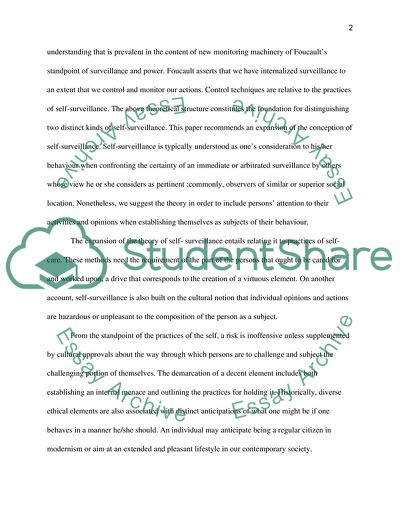Cite this document
(The Surveillance Practices Article Example | Topics and Well Written Essays - 2250 words, n.d.)
The Surveillance Practices Article Example | Topics and Well Written Essays - 2250 words. https://studentshare.org/sociology/1863259-foucault-argues-that-we-have-internalised-surveillance-and-we-that-monitor-and-police-our-own-actions-to-what-extent-is-this-an-accurate-analysis-of-contemporary-society-discuss-using-examples-that-you-have-thought-of-yourself
The Surveillance Practices Article Example | Topics and Well Written Essays - 2250 words. https://studentshare.org/sociology/1863259-foucault-argues-that-we-have-internalised-surveillance-and-we-that-monitor-and-police-our-own-actions-to-what-extent-is-this-an-accurate-analysis-of-contemporary-society-discuss-using-examples-that-you-have-thought-of-yourself
(The Surveillance Practices Article Example | Topics and Well Written Essays - 2250 Words)
The Surveillance Practices Article Example | Topics and Well Written Essays - 2250 Words. https://studentshare.org/sociology/1863259-foucault-argues-that-we-have-internalised-surveillance-and-we-that-monitor-and-police-our-own-actions-to-what-extent-is-this-an-accurate-analysis-of-contemporary-society-discuss-using-examples-that-you-have-thought-of-yourself.
The Surveillance Practices Article Example | Topics and Well Written Essays - 2250 Words. https://studentshare.org/sociology/1863259-foucault-argues-that-we-have-internalised-surveillance-and-we-that-monitor-and-police-our-own-actions-to-what-extent-is-this-an-accurate-analysis-of-contemporary-society-discuss-using-examples-that-you-have-thought-of-yourself.
“The Surveillance Practices Article Example | Topics and Well Written Essays - 2250 Words”. https://studentshare.org/sociology/1863259-foucault-argues-that-we-have-internalised-surveillance-and-we-that-monitor-and-police-our-own-actions-to-what-extent-is-this-an-accurate-analysis-of-contemporary-society-discuss-using-examples-that-you-have-thought-of-yourself.


